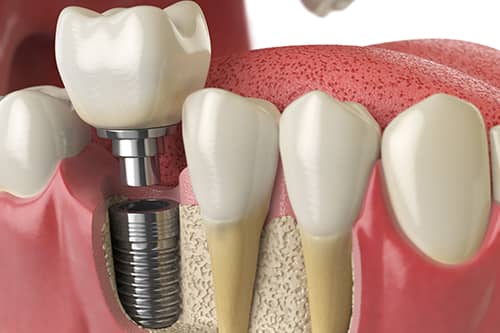Reviewed by Dr. Mike Norouzinia, DDS, and Dr. Kerri Font, DDS

Dental implants are an increasingly popular option for individuals with missing teeth, providing a durable, natural-looking, and functional solution. As with any surgical procedure, patients may have concerns about the healing process following a dental implant procedure.
In this guide, we’ll address common post-operative concerns, provide insight on proper post-op care, and discuss timelines for complete healing.
Table of Contents
- The Days After Surgery: A Timeline of Healing
- Post-Operative Care: Caring for Your Surgical Site
- Managing Discomfort and Swelling: Tips for Relief
- Keeping Implants Healthy: Long-Term Care Tips
- Dental Implants in Highlands Ranch
- FAQs About Healing After Dental Implants
The Days After Surgery: A Timeline of Healing
Your recovery time will vary depending on the complexity of your case and age. Here is a general timeline for healing following dental implant placement.
In the first 24 to 48 hours after surgery, swelling and discomfort may reach their peak and then begin to subside. Minor bleeding may also occur during this period. It’s important to rest during these initial days and to avoid strenuous activities that could exacerbate swelling or bleeding.
On days 3 to 7 post-surgery, the swelling should significantly decrease, and the discomfort should gradually lessen. It’s at this point that patients can usually begin to return to their normal routines, though it’s still essential to be gentle around the implant areas during eating and oral hygiene practices.
From the second week onwards, most of the surgical symptoms should have resolved. However, the healing and osseointegration (the process where the implant fuses with the jaw bone) continue beneath the surface. It’s crucial to continue following your dentist’s instructions for care and to keep all follow-up appointments to ensure a smooth and successful healing process.
Key Takeaway
The time it takes to heal after dental implants is greatly influenced by at-home care. It is important to follow the post-op instructions given by your surgeon to ensure a smooth recovery and to ensure the implants successfully fuse with the jaw bone.
Post-Operative Care: Caring for Your Surgical Site
To promote healing and minimize complications, follow these guidelines for your post-operative care:
- Avoid brushing the surgical area and use a soft-bristle toothbrush to brush the other areas of your mouth.
- Rinse with saltwater or antibacterial rinse twice a day, beginning the day after the surgery. Mix 1/2 teaspoon of salt in 8 ounces of warm water and gently rinse the area.
- Avoid smoking and drinking alcohol during the healing process, as these activities can significantly hinder healing. For more information about the effects of smoking on dental implants, read How Smoking Affects Your Oral Health and the Success of Dental Implants.
- Steer clear of hot or carbonated beverages as they can irritate the surgical site.
- Prioritize a soft foods diet for the first week after surgery, gradually incorporating more solid foods as tolerated.
- Schedule follow-up appointments as directed by your oral surgeon or dentist.
We will provide you with detailed post-operative care instructions following your procedure. Be sure to ask any questions you may have during this time, and contact us right away if any problems arise.
Managing Discomfort and Swelling: Tips for Relief
While discomfort and swelling are expected side effects, there are several things you can do to minimize your discomfort.
- Take prescribed medications as directed. We may prescribe medications for pain relief, antibiotic protection, or to minimize swelling.
- Over-the-counter medications like ibuprofen and acetaminophen can be used as a first line pain management tool (if approved by your doctor). Always follow the recommended dosages.
- Apply ice packs to the affected area to alleviate swelling. Use for 20-minute intervals followed by a 20-minute break during the first 48 hours after surgery.
- Eliminate stress, prioritize sleep, and stay hydrated.
Keeping Implants Healthy: Long-Term Care Tips
Once your implant site has healed completely, proper care and maintenance is essential for keeping your implants healthy and preventing damage or decay.
- Brush twice daily with a soft-bristle toothbrush, using a fluoride toothpaste.
- Floss your teeth at least once daily, using gentle motions around the implant sites.
- Schedule regular dental checkups (at least twice a year) to monitor implant health and detect any issues early on.
If properly cared for, dental implants can last a lifetime. By following the guidelines outlined here, you can ensure that your new smile remains healthy and strong for years to come. For more information about potential complications, read Understanding Potential Complications of Dental Implants.
Dental Implants in Highlands Ranch
At Highlands Ranch Periodontics and Dental Implants, our team is committed to ensuring the health and longevity of your dental implants. We are here to guide you through every phase of your implant journey, from surgical procedure to post-operative care to long-term maintenance.
If you are considering dental implants or need professional advice on maintaining your existing ones, don’t hesitate to contact us. If you are searching for dental implants in Highlands Ranch, call (303) 683-1144 or complete the online booking form.
FAQs About Healing After Dental Implants
The healing process takes several weeks, with most of the swelling and discomfort subsiding within the first week after surgery. The implant site must heal completely before a permanent crown or other restoration can be placed, which typically takes several months.
Yes, dental implants are considered a very safe option for replacing missing teeth when performed by an experienced professional. As with any surgery, there are risks involved; however, these can be minimized by following your post-operative instructions carefully and keeping regular follow-up appointments.
The degree of discomfort varies from person to person, but most patients report minimal pain following the procedure. Pain medication is typically prescribed in order to manage any discomfort during the healing process.
If you are searching for dental implants near me, trust the experts at Highlands Ranch Periodontics and Dental Implants.
